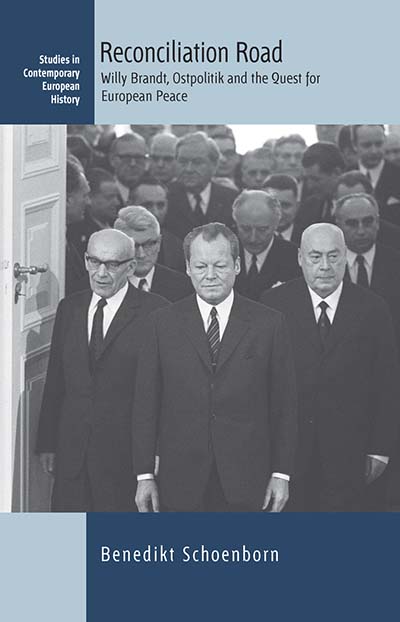“Maybe the parties involved in negotiating an end to the war in Ukraine can revisit some of Brandt’s creative thinking and personal gestures as inspiring examples for the beginnings of a new reconciliation. They can use Benedikt Schoenborn’s excellent study of reconciliation and Ostpolitik as their guide.” • H Diplo
“Benedikt Schoenborn delivers here a book of rare quality. Taking up a theme already amply documented, he manages to achieve a double tour de force: historiographical, by proposing a new reading of Brandtian Ostpolitik through the prism of reconciliation; and methodological, mobilizing the toolbox of political science to analyze historical material. The exercise is therefore, from all points of view, successful, and can easily be described as a model of its kind.” • Francia Recensio
“Schoenborn’s mastery of the literature about Brandt is comprehensive and impressive… His study, although archivally based in Brandt’s papers, is inherently interdisciplinary, employing a theoretical perspective that borrows from sociology, philosophy, political science, and even religious studies.” • Diplomatic History
“Political scientists and sociologists interested in reconciliation and transition studies in any contemporary setting will also find much to appreciate in this richly researched international history.” • German Politics and Society
“Reconciliation Road is a valuable and thorough engagement with Willy Brandt’s full foreign policy engagement against the backdrop of peace and reconciliation studies. It constitutes a needed contribution and fresh perspective on a clearly very important European politician.” • Peace and Change
“Schoenborn’s writing is concise and uncluttered; the thrust of the book is interpretive rather than expository, and the narrative chapters make ongoing use of theoretical insights outlined at the book’s outset… Schoenborn’s book provides a welcome reminder of how much a well-researched account of high politics—drawing on personal papers, parliamentary records, and the documents of multiple foreign ministries—can contribute to an understanding of postwar West German values and aspirations.” • Central European History
“This is a valuable addition to the literature on Willy Brandt and Ostpolitik. Schoenborn demonstrates that the spectre of the Nazi past was always present, and that reconciliation was a much more ambitious aim than détente.” • Gottfried Niedhart, University of Mannheim
“Schoenborn draws on insights from political science and sociology to convincingly demonstrate how important a conceptual tool reconciliation is for understanding Brandt’s Ostpolitik. At the same time, he illuminates the fascinating ways that human interactions and cultural forces played out in the realm of diplomacy.” • Christian Bailey, Purchase College
Among postwar political leaders, West German Chancellor Willy Brandt played one of the most significant roles in reconciling Germans with other Europeans and in creating the international framework that enabled peaceful reunification in 1990. Based on extensive archival research, this book provides a comprehensive analysis of Brandt’s Ostpolitik from its inception until the end of the Cold War through the lens of reconciliation. Here, Benedikt Schoenborn gives us a Brandt who passionately insisted on a gradual reduction of Cold War hostility and a lasting European peace, while remaining strategically and intellectually adaptable in a way that exemplified the ‘imaginativeness of history’.
Benedikt Schoenborn is an Associate Professor at Tampere University in Finland. His publications include the award-winning book La mésentente apprivoisée: de Gaulle et les Allemands, 1963-1969 (Paris 2007), and, with J.M. Hanhimäki and B. Zanchetta, Transatlantic Relations since 1945: An Introduction (London 2012).
LC: DD259.4 .S2565 2020
BISAC: HIS014000 HISTORY/Europe/Germany; HIS037070 HISTORY/Modern/20th Century; POL011000 POLITICAL SCIENCE/International Relations/General


